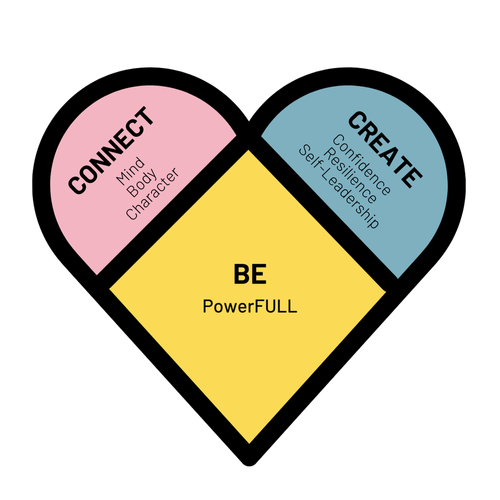By: Lex Moschakis

This is a gorgeous picture of my husband and I on the Amalfi Coast in Italy in 2022. It went straight to my Instagram. And while I look happy and carefree, my Voice of Small (negative self-talk) was being *really* loud. Everyone around me was taking photos in various model-esq poses, and I felt pressured to do the same so I could post it on social media
I asked my husband, Dan, to take the photo of me, but my Voice of Small kept saying “you look like you’re trying too hard.” I felt wildly uncomfortable in my body, and when I looked at the photos Dan took, my Voice of Small said "You look terrible, how can you not know how to take a nice photo of yourself yet?"
But then, because acknowledging my own discomfort was too hard, I got frustrated at Dan for “failing to take a nice photo of me.” Enter a sudden shame spiral, which prompted more anxiousness, and my Voice of Small said "poor guy, being married to you."Determined, I grabbed the phone out of his hand and took this selfie, which I posted on Instagram straight away (with a filter… which it didn’t need!).
We sat on the beach for 5 more minutes before I realized I needed to be alone to connect with myself and process the anxiety I was feeling. We went home, I was able to regulate myself, and I was able to piece together what happened in my mind and own my reaction. I apologized, we had a wonderful dinner, and that was that.
If this had happened to me at 14 years old? There would have been no awareness, no regulation, and a complete internalization of the message that is currently hammering our youth:
I am not enough.
Everywhere you turn you’ll find a heart wrenching, gobsmacking statistic on the impact of social media on the mental health of our youth. I won’t repeat them here - you know it’s bad. If we lived in an ideal world, the obvious solution would be that youth stay away from their phones and get back outside to ride bikes in the streets, peruse the malls, and go to the local diner for a milkshake.
But there are three things wrong with this solution:
-
Kids today don’t remember a time without social media. It’s as normal a part of their world in the same way that most of us don’t remember life without TV. And in many ways TV isn’t so great for us either, but how many of us would give it up? Ask my husband to turn off the TV on football Sunday and witness total confusion and horror…
-
The adolescent’s developmental job is to break away from the family unit and connect with their peers. If their peer connection is at least partially on social media, but they’re not, they’re disconnected. That’s more than just a terrifying prospect for an adolescent; it’s a developmental hindrance.
-
Social media is harmful and helpful, when we use it the right way. It can be a place for artistic expression, a way to communicate with a new community, share about our lives with friends and family on the other side of the world, and provide greater access to helpful information.
So if a 14 year old came to me and said, “I’m coming off the apps” would I applaud them? Abso-fricken-lutely. That is a child wise beyond their years; I rarely hear that proclamation from adults (newsflash: social media isn’t good for our mental health, either). But I would never ask it or expect it, and I don’t think you should either.
So what can we do about it?
Role model
I know you know that kids learn from what you do, not what you say. But your emails? As far as kids are concerned, that counts as social media too. So even if you really need to check your emails, your Slack, or your texts, you are role modeling being interrupted by a notification, disconnecting from the real world to check it, and possibly, disconnecting from the child in front of you. The message that sends is that it’s okay for them to do that on Instagram, TikTok, [insert latest social platform that’s cool these days]. Can that email wait? In my experience, 9 times out of 10 the answer is “yes”.
Educate
Help kids understand why they might feel “stuck” on their phones. Do they know that a notification releases a hit of dopamine in their brain that keeps them wired for the next one? Do they understand that a feed with bite sized content is prohibiting their ability to focus on anything for more than 10 seconds? Do they know that social media companies make BILLIONS of dollars advertising to them, selling their data, and that their #1 goal is user engagement? It might not be “cool” for kids to care about these things at first, but if you plant the seed without judgment or expectation, it will eventually grow to an awareness that these platforms have been designed with addiction at its core, and that’s not okay.
Guidelines
There IS a way to use social media while optimizing its helpful sides, respecting your own boundaries, and staying connected to the essence of who you are while you scroll. It doesn’t HAVE to impact your self view and mental health.
To help kids (and adults) do this, at Live Big Community we teach a 5-pronged approach called the Socials Wheel. I won’t share all five of those prongs but here is the first and most relevant to this blog post:
Prong #1: Limit Your Notifications
In an ideal world, all notifications are off. But a good starting place for parents is turning them off during family time, like during dinner or movie night (if your child still graces you with their presence on a Friday night). I promise you, they’ll complain about it. You will be labeled deeply uncool, unfair, and possibly the “worst parent on the planet.” But often kids tell us that it can be a relief to have parents and teachers set these boundaries for them, even if they don’t want to admit it in the moment, because then they can tell their friends that their lame parents made them do it, thereby saving face in front of their peers. Maybe this goes without saying, but refer back to (1); you have to turn yours off too.
I know this is a lot of work. It’s not a one-and-done solution; it’s a lifestyle. It takes a village to shift a culture; guardians, educators and community members coming together to support our youth in all the ways we know how. But if we don’t collectively battle the havoc that is being wreaked on our youth, the state of their mental health is going to get worse. We know more now about the impact of social media than we ever have before. It’s now on us to put that knowledge to work so that no child is ever sitting on their phones, fear-posting or doom-scrolling, internalizing the message of “I am not enough.”
Lex is leading a FREE webinar Tuesday, January 14, 2025, 6 pm - 7 pm.
Here is a quick blurb about the webinar:
The Voice of Small
Working with Negative Self-talk to Create Resilience

Everyone has the capacity to build resilience. Resilience helps us work with the Voice of Small. It's pesky and sometimes it’s loud. The Voice of Small is inside your head, it puts you down, and tells you that you can't do hard things. The problem is that you become so used to hearing it that it starts to sound like the truth. When you believe the mean things it says, it zaps your energy and your ability to be resilient. In this webinar, you'll learn where the Voice of Small comes from and strategies to work with it so that you can create resilience.
The event is free! Come invest (virtually) in yourself as we start the new year.

